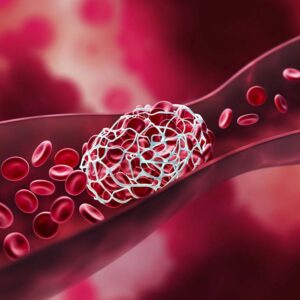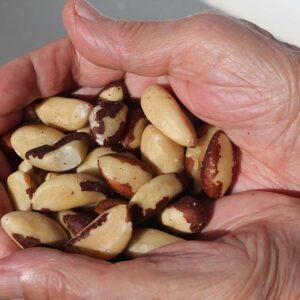
Are You Just a Taxi for Your Microbiome?
Who are you?
More broadly, what is a human being?
It’s an old question. Scientists, philosophers, poets, kings, and peasants each have a unique answer.
But Justin Sonnenburg’s take is perhaps the most illuminating — and the most humbling.
Each of us is, he says, is “an elaborate vessel optimized for the growth and spread of our microbial inhabitants.”
Chew on that. I’ve been doing so for months.
I’ve had several opportunities to chat with Sonnenburg over dinner, where we fed our greedy digestive tract populations while discussing how they push and pull on our physical and mental health.
Sonnenburg is a professor of microbiology and immunology at Stanford. He is also perhaps the world’s leading researcher of the microbiome.
Nobel laureate Joshua Lederberg coined the term over a decade ago.
It refers to the 100 trillion microbes that live on our skin, in our hair, under our fingernails, but mostly within us, from the mouth to the esophagus, stomach, and large and small intestines.
This little village of bugs weighs a mere two-three pounds. While generally secreted within us, we do catch sight of it when nature calls — roughly half of fecal material’s mass is made of microbiotic creatures.
These microbes outnumber our human cells — the ones with our unique DNA — 10 to one. Even more impressive, the number of genes they contain outnumbers those in our unique cells roughly 100 to one.
But learning about the microbiome is far more than an exercise in humility — refreshing and useful as that may be.
The healing potential of this little ecosystem is vast.
While human beings all have similar DNA profiles, our microbiomes are vastly different. Dr. David Perlmutter — author of the best-seller Brain Maker, which digs into the complex, fascinating world of the gut-brain system — says about 40 percent of gut microbes are common to every human being.
But the remaining 60 percent is different — sometimes dramatically so.
Sonnenburg wants to create a system in which “microbiota typing” becomes as common in medical treatment as classifying blood type.
Understanding the unique community within a patient, he says, could shed a brilliant light on why that person is sick and what might return him or her to health.
Generally — as with any other ecosystem — the more diversity in the microbiome, the better.
Unfortunately, American and other Western microbiotic populations are becoming increasingly simple, leading to increasing sickness.
This unfortunate simplification is largely due to an increase in:
- Processed foods in the diet, especially processed carbohydrates
- Antibiotics exposure, both from medical treatment and residue in foods
- C-section deliveries — infants who don’t exit via the birth canal are deprived of exposure to vital microorganisms that “seed” the gut.
These changes have brought about a great deal of suffering.
Research suggests that allergies, autoimmune diseases, obesity, Type 1 diabetes, asthma, gluten sensitivity, and even mental illness can all be made better or worse by changing the gut-microbe ecosystem.
There is much, much more to be written about this — and I will!
But I’ll leave you with a therapy that’s both exciting and, well, not for the squeamish.
Fecal microbiota transplantation (FMT) involves transplanting — via an enema, nasal tube, or frozen material in a pill — fecal material from a healthy donor to a sick one.
It works wonders for patients infected with Clostridium difficile, usually known as C. diff. This nasty little bug laughs off antibiotic assaults.
It causes severe diarrhea and kills about 14,000 Americans annually.
A landmark study found that FMT cured 91 percent of people with C difficile infection. (1) Antibiotics are typically far less successful.
Fortunately, there are plenty of ways, aside from fecal transplants, to foster healthy bugs in our guts. I’ll discuss some of those in future issues of Natural Health Solutions.
In the meantime, remember that you are never really alone. For better or worse, you carry a community wherever you go.
Regards,

Brad Lemley
Editor, Natural Health Solutions
Citation:
1. Rohlke F, Stollman N. Fecal microbiota transplantation in relapsing Clostridium difficile infection. Therapeutic Advances in Gastroenterology. 2012
Written By Brad Lemley
Brad Lemley is a science and health writer and former senior correspondent for The Washington Post and Discover magazine. He is a tireless advocate for safe, natural, self-directed healthy living practices and therapies.
View More Free Articles
Take the SHORTER Path to Dramatically Better Health
Are you tired of fitness gurus preaching the virtues of 5 AM workouts and pushing Olympic-level training regimens? Their narrative can feel exhausting and entirely unattainable. But before you toss in the towel completely, I’ve got news that might just put a spring back into your step. A groundbreaking new study reveals that the key...
Unexpected Perks of Your Coffee Habit Revealed!
We all know that the first cup of coffee in the morning can FEEL like a lifesaver. But what if it might actually BE saving your life? A groundbreaking new study suggests that your daily coffee habit could be protecting you from not just one but multiple chronic diseases. Let’s pour over this fascinating research…...
The TRUTH About Diabetes Drugs and Brain Aging
You’ve probably seen the gushing headlines… Most say something like, “Common diabetes drug protects the brain against aging!” And let’s face it, that sounds fantastic. After all, who doesn’t want to keep their brain young and in tip-top shape? The headlines refer to the results of a new study that suggests the widely prescribed type...
Hidden Smartphone Danger Puts You at Risk
Remember when we thought cell phones were just something for young folks to obsess over? Back when we were convinced they were nothing more than a passing fad? Well, times certainly have changed. Now, most people… including many of us older folks… have jumped on the smartphone bandwagon. Heck, some of us are practically as...
Preserve Your Mobility with “Agile Aging” Exercises
Aging has a way of humbling us. You lose hair where you want to keep it—and often end up growing it where you don’t. With every passing year, your eyesight fades, and your waistline expands. And as your once quick pace begins to slow, you fear developing the dreaded “senior shuffle.” But here’s the thing....
Yes, Lazy Saturday Lie-Ins Can BOOST Your Health
Are you burning the midnight oil during the week and catching up on sleep on weekends? Well, I’ve got some news that might help you feel less guilty about those lazy Saturday mornings. A new study suggests that weekend lie-ins might be doing far more than just helping you feel refreshed. Experts say they could...
Mailbag: 7 Hidden Culprits Behind Your Weight Gain
“Why am I gaining weight, even though I am watching what I am eating?” – Battling the Bulge Dear Battling, Gaining weight when you’re not trying to is frustrating. And it just gets worse as we age… often regardless of our diet. The truth is that various factors can promote weight gain even when you’re...
Popular Artificial Sweetener Linked to Dangerous Heart Risk
Remember when erythritol was the darling of the health food world? Well, this popular sugar substitute might not be as sweet a deal as we were led to believe… A shocking new study reveals a dark side to this widely used artificial sweetener. It turns out erythritol is associated with a dangerous—and even deadly—heart risk....
Cracking the Code on Chronic Inflammation
Inflammation and obesity are the evil tag team at the heart of nearly every major disease we face—from diabetes to obesity. What starts as a normal, healthy process to fend off dangerous invaders can quickly fan into the flames of chronic inflammation… and that includes in your gut. The trouble is almost no one has...
Dreaming of Better Sleep? Your Gut Holds the Key
Do you toss and turn at night? If so, you’re not alone. In fact, if you’re a senior over 65, you join nearly 17 percent of your peers who ALSO struggle with poor sleep quality. But science has uncovered a natural supplement that not only could help you catch more Z’s but can also give...









